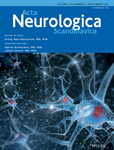Cognitive decline before and after a first-ever stroke in Africans
Funding information
This work was supported by the Medical Education Partnership Initiative Junior Faculty Research Training Program under Fogarty international grant (D43TW010140).
Abstract
Objectives
There is a knowledge gap on the impact of pre-existing cognitive decline on poststroke decline in indigenous Africans. We describe the trajectories of domain-specific cognitive and activities of daily life (ADL) functioning across the first year of stroke in Nigerians with pre-existing cognitive decline.
Materials and Methods
Prospective observational study. Prestroke cognitive decline was ascertained retrospectively using the 16-item Informant Questionnaire for Cognitive Decline in the Elderly (IQCODE). Assessments for global cognition, learning, memory, executive and ADL functioning were conducted at 3 time points using the Mini-Mental state examination (MMSE), 10-words list learning and delayed recall test (10 WDRT), Animal naming test and Barthel index, respectively.
Results
Among 150 stroke survivors, prestroke cognitive decline was found in 25 (16.7%, 95% C.I = 11.5%–23.6%). In linear regression analyses adjusting for the effect of age, education, stroke severity and comorbid diabetes mellitus, prestroke cognitive decline predicted poor memory scores at one year [Adjusted standardized mean difference (SMD) = −0.6, 95% C.I = −1.1, −0.1, p = 0.016)]. The association of prestroke cognitive decline with poststroke poor memory was substantially mediated by age (SMD = −0.9, 95% C.I = −1.4, −0.4, p < 0.001).
Conclusion
Pre-existing cognitive decline in this sample was associated with an age-mediated poor memory function at one-year poststroke. Early institution of targeted cognitive rehabilitation in stroke survivors with pre-existing cognitive decline may reduce the neurocognitive burden of stroke in Black Africans.
CONFLICT OF INTEREST
On behalf of all authors, the corresponding author states that there are no conflicts of interest.
Open Research
DATA AVAILABILITY STATEMENT
The data that support the findings of this study are available from the corresponding author upon reasonable request.




